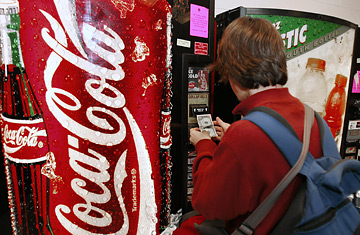
A student uses a Coke machine
Lots of college students get to know their peers through drinking. At Smith College, students got to know each other over drinking soda — or, rather, not drinking it. In May, a group on campus forced the school to end its exclusive contract with Coca-Cola.
Students in Smith's Students for Social Justice and Institutional Change had become aware of allegations that Coca-Cola was complicit in human rights violations at a bottling plant in Colombia and had contributed to environmental degradation in India. Such actions would be in violation of Smith's Vendor Code of Conduct, which demands fair business practices of its vendors, including safe working conditions and a commitment to fair wages. In statements posted on the company's website, Coke has denied the allegations and argues that boycotts of Coke products are detrimental to local economies.
Ally Einbinder, the Smith sophomore who helped lead the charge that forced the college to end its contract with the company, says that aside from the allegations themselves, she felt that the exclusivity of the contract was of concern. "There were very few beverage options on campus that weren't Coke brand," she says, noting that the only non-Coke drinks sold on campus were Stewart's soda (owned by Cadbury Schweppes, another soft drink conglomerate) and Vitamin Water, which was recently bought by Coca-Cola.
About forty other U.S. schools, including Rutgers University in New Jersey and New York University, have chosen to end their Coca-Cola contracts since 2005, but it was still an uphill battle for Smith students to get their concerns heard by the college administration as well as their fellow students. To raise awareness on campus, Einbinder and her group held creative events like "Take a Keg Stand Against Coke," where students could drink from a keg of locally made root beer and learn about the campaign. They also joined members of the faculty and administration on a Soft Drink Advisory Committee formed to address the issue.
Kristen Cole, Smith's media relations director, says that the school's administration has been receptive in the past to issues concerning human rights, noting that Smith voted last year to divest from companies doing business in Sudan's Darfur region. "Smith takes the issues of human rights and environmental sustainability very seriously," Cole says.
The Smith students' campaign has made an impression on Coca-Cola, which sent spokespeople to meet with concerned students and faculty at the schools that have considered bans. "These kids are very civic-minded," says Diana Garza, a Coca-Cola spokeswoman. "A lot of these students have a very global perspective. They're in America and go to great American schools, they have access to all of the conveniences of life here, but they're very clued in to the difficulties of what it's like to live in other parts of the world." The company has a website, cokefacts.com, outlining their efforts to ensure fair labor and environmental practices in India, Colombia and other countries. The company also agreed in April 2006 to an independent investigation by the United Nations International Labor Organization (ILO), a move that prompted the University of Michigan, which had suspended its Coca-Cola contract in December 2005, to reactivate it. Smith, however, decided to go ahead with their ban.
When Coke was kicked off Hampshire College, down the street from Smith, administrators instead signed a contract with a local company, Worcester, Mass.-based Polar Beverages. But college president Ralph Hexter hasn't written Coke off completely, and urges his students not to either. He says he wants to make sure that the Hampshire group who organized the ban keep an open dialogue with Coke. If the company can adapt, he says, students "have to stand by and be ready to revise [their] opinion."
In the meantime, another beverage company hopes to capitalize on the socially active movements on campus. Honest Tea, a ready-made tea and fruit drink company, is expected to have annual sales of $25 million this year and was, according to its website, the first bottled tea manufacturer to provide fair trade products. "We always talk about our consumer as the conscious consumer, and no place gets more conscious than a college campus," says Seth Goldman, Honest Tea's CEO. "It's a great time for them to be thinking about, 'I just bought a drink. What is the impact of my decision?'"
Einbinder has similar hopes. "As with many college campuses, the activist community at Smith is small," she says. "But I guess it's just like Margaret Mead said: 'Never doubt that a small group of thoughtful, committed citizens can change the world. Indeed, it is the only thing that ever has.'"